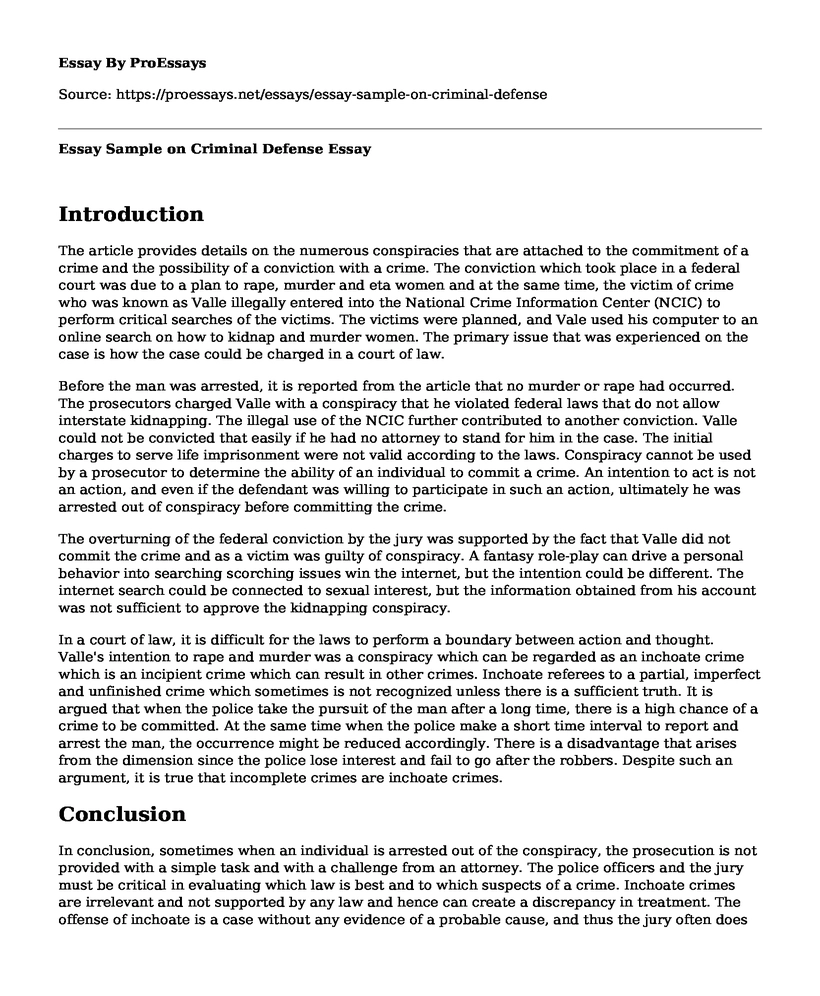Introduction
The article provides details on the numerous conspiracies that are attached to the commitment of a crime and the possibility of a conviction with a crime. The conviction which took place in a federal court was due to a plan to rape, murder and eta women and at the same time, the victim of crime who was known as Valle illegally entered into the National Crime Information Center (NCIC) to perform critical searches of the victims. The victims were planned, and Vale used his computer to an online search on how to kidnap and murder women. The primary issue that was experienced on the case is how the case could be charged in a court of law.
Before the man was arrested, it is reported from the article that no murder or rape had occurred. The prosecutors charged Valle with a conspiracy that he violated federal laws that do not allow interstate kidnapping. The illegal use of the NCIC further contributed to another conviction. Valle could not be convicted that easily if he had no attorney to stand for him in the case. The initial charges to serve life imprisonment were not valid according to the laws. Conspiracy cannot be used by a prosecutor to determine the ability of an individual to commit a crime. An intention to act is not an action, and even if the defendant was willing to participate in such an action, ultimately he was arrested out of conspiracy before committing the crime.
The overturning of the federal conviction by the jury was supported by the fact that Valle did not commit the crime and as a victim was guilty of conspiracy. A fantasy role-play can drive a personal behavior into searching scorching issues win the internet, but the intention could be different. The internet search could be connected to sexual interest, but the information obtained from his account was not sufficient to approve the kidnapping conspiracy.
In a court of law, it is difficult for the laws to perform a boundary between action and thought. Valle's intention to rape and murder was a conspiracy which can be regarded as an inchoate crime which is an incipient crime which can result in other crimes. Inchoate referees to a partial, imperfect and unfinished crime which sometimes is not recognized unless there is a sufficient truth. It is argued that when the police take the pursuit of the man after a long time, there is a high chance of a crime to be committed. At the same time when the police make a short time interval to report and arrest the man, the occurrence might be reduced accordingly. There is a disadvantage that arises from the dimension since the police lose interest and fail to go after the robbers. Despite such an argument, it is true that incomplete crimes are inchoate crimes.
Conclusion
In conclusion, sometimes when an individual is arrested out of the conspiracy, the prosecution is not provided with a simple task and with a challenge from an attorney. The police officers and the jury must be critical in evaluating which law is best and to which suspects of a crime. Inchoate crimes are irrelevant and not supported by any law and hence can create a discrepancy in treatment. The offense of inchoate is a case without any evidence of a probable cause, and thus the jury often does not have supportive statements from federal law. Therefore, before a conviction, it is essential for the jury to evaluate and come up with an appropriate solution which is legally recognized by the law.
Cite this page
Essay Sample on Criminal Defense. (2022, Nov 22). Retrieved from https://proessays.net/essays/essay-sample-on-criminal-defense
If you are the original author of this essay and no longer wish to have it published on the ProEssays website, please click below to request its removal:
- Paper Example - Procedure for Photographing a Crime Scene
- Retributive Justice Essay Example
- Watkins V. The State Case Study
- Fraud and White-Collar Crime Paper Example
- A Critical Analysis of George Sodini and Social Control Theory Paper Example
- Essay Example on Patients' Rights in Medical Care: A Must-Follow
- Paper Example on Joanne's Right to Safety and Stable Childhood







